|
Lawrence Campe Almshouses 213-227 Friern Barnet Lane, Whetstone, N20 0NG |
In 1612, a year before his death, Lawrence Campe, a draper's merchant in the City of London, founded almshouses for 6 poor people in the parish of Allhallows, London Wall. In addition, he founded almshouses for 12 poor elderly people in the parish of Friern Barnet.
Two terraces of 2-storey red brick buildings were built on a plot of land of some 1.5 acres. They were set back from the road, with a strip of garden in front. In addition to accommodation, they included two communal rooms - one for prayer and the other for washing, baking and brewing.
The almspeople received a monthly stipend of 1 shilling (5p) each. The church wardens of St James received 4 shillings (20p) a year for managing the charity, with an additional sum of £1 6s 8d (£1.33) a year to keep the buildings in repair. The funds were provided from a rent charge on an estate in Hertfordshire.
In 1728 the almshouses were damaged by fire and were largely rebuilt. The communal rooms were converted into additional almshouses.
In 1778 one almshouse was vacant, but the others had 19 occupants, including two families. Eight of the residents were considered unsuitable.
The buildings were repaired in 1785-1786.
In 1809 the almshouses were repaired again. One of the largest rooms was used as a school. In 1828 the schoolmaster and schoolmistress were also accommodated. By then prayers were no longer said by the almspeople, one of whom was a woman of evil reputation, while some were natives of other parishes. In 1838 the sexton was also living there.
In 1843 the almshouses were renovated and the front elevation covered with stucco.
In 1851 the almshouses contained 21 inhabitants, including 8 elderly people and, in two of the dwellings, the families of the schoolmaster and schoolmistress, and of the parish clerk.
Prayers were restored in 1854, a year after the school closed (but ceased again in 1883).
In 1871 there were 16 residents. By 1876 the almspeople were receiving a weekly pension of 2 shillings (10p).
In 1896 the almshouses and their funds were vested in a charity known as the Consolidated Almshouse Charity of Lawrence Campe, which was managed by the rector, the churchwardens and three representatives of Friern Barnet Urban District Council.
In 1897 there were 17 inmates.
The buildings were repaired again in 1899, being largely rebuilt to celebrate the Jubilee of Queen Victoria. By this time it was claimed that the almspeople had been chosen regardless of religious beliefs.
In 1903 applicants for accommodation in the almshouses were required to be aged over 70 years and to have lived in Friern Barnet for at least 20 years. They were expected to have an annual income of not less than £31 and not to be in receipt of poor relief.
In 1938 there were 7 inmates.
After WW2 (1939-1945) the council requisitioned the almshouses. Three of the dwellings were refurbished in 1946 and the others after 1956, partly at the trustees' expense.
In 1949 the buildings were Grade II listed.
In 1961 the pensions paid to the almspeople ceased as the charity had no income. In the following year, increased investments provided an income of £175, enabling the buildings to be maintained.
In 1976 a Scheme provided that the inmates should contribute towards the running costs of the almshouses.
In 1982 the buildings, again in a state of disrepair, were restored at a cost of £17,000 following a grant from the newly formed Heritage of London Trust and donations raised from local firms and people. On 1st December the Prime Minister Margaret Thatcher unveiled a plaque commemorating their restoration.
In the spring of 1983 work began to build new housing units at the rear of the almshouse buildings.
Current status
The almshouses are today administered by the Lawrence Campe's Almshouse Trust, providing accommodation for people aged over 50 years with limited means. Modern housing has been built behind the buildings in Lawrence Campe Close.N.B. Photographs obtained in December 2019
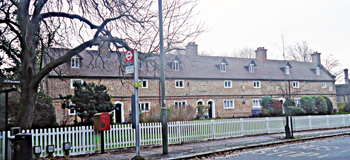
The almshouses are some of the oldest in London.
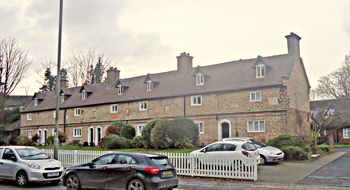
Modern housing - consisting of some 12 or so 2-bedroomed townhouses - has been built behind the almshouses, in Lawrence Campe Close.
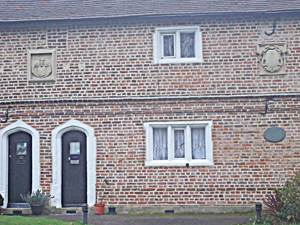
The front of the building has various stone plaques mounted on it.
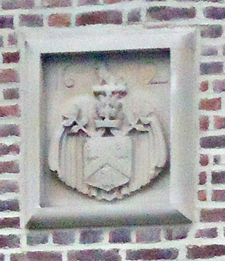
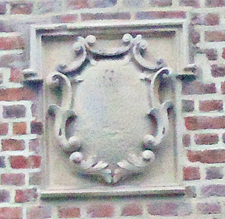
The stone plaques are rather weathered.
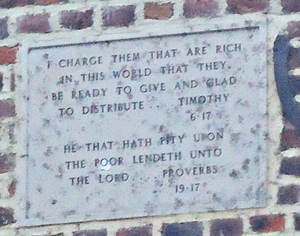
The above plaque remains legible but that below is totally eroded.
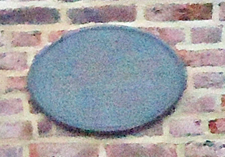
References (Accessed 22nd May 2023)
(Author unstated) 1820 Parliamentary Papers, vol. 5. London, HMSO, 107-109.
Cherry B, Pevsner N (1998) London: North. New Haven, Yale University Press.
Thorne J 1876 Handbook to the Environs of London. London, Murray. p32.
https://en.wikipedia.org
https://historicengland.org.uk (1)
https://historicengland.org.uk (2)
https://londongardenstrust.org
https://register-of-charities.charitycommision.gov.uk
www.akg-images.co.uk
www.alamy.com
www.barnet.gov.uk
www.british-history.ac.uk (1)
www.british-history.ac.uk (2)
www.friern-barnet.com
www.heritageoflondon.org
www.londonpicturearchive.org.uk(1)
www.londonpicturearchive.org.uk (2)
www.londonpicturearchive.org.uk (3)
www.londonscreenarchives.org.uk
www.margaretthatcher.org
Last updated 21st August 2023
Click here to return to Almshouses of London alphabetical list
Click here to return to home page